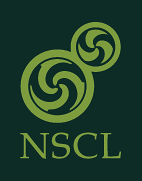Undergraduate Research
Undergraduate students with different interests and backgrounds participate in research and other activities at the Laboratory. At present, the number of undergraduates active at the Laboratory exceeds 80 from about 20 different majors. A large fraction of these students are from the Department of Physics and Astronomy, the Department of Chemistry, and the Department of Engineering, but students from many other departments, find exciting projects and valuable experience at the Laboratory as well.
Because NSCL is conveniently located in the middle of MSU campus, it is relatively easy to pursue a research project on a continuing basis during regular semesters. In addition, there are exciting opportunities to get engaged during the summer, also for students from other universities and colleges. To get an idea of what specific faculty at NSCL do, it is helpful to have a look at the graduate student brochure, which provides a 1-page overview of the research pursued by each faculty member at NSCL. If you have questions, you can also contact the NSCL Associate Director for Education.
Undergraduate Research Applications through venture.msu.edu
Undergraduate students interested in pursuing a research project can submit an application through venture.msu.edu. The specific ad for research projects at NSCL can be found here. Make sure to provide all the requested information so that your application can easily be processed and considered. The qualifications vary a lot depending on the project. In general students in physics, chemistry or engineering with an interest in nuclear, astrophysical or accelerator sciences are encouraged to apply.
Professorial Assistants
Each year, several freshmen and sophomore students work as Professional Assistants with NSCL in their research groups. The Professorial Assistants program is organized through the MSU Honors college, and detailed information can be found on the program’s website. Professorial Assistants work with Laboratory Faculty for 1 or 2 years and sometimes continue as undergraduate student researchers at NSCL after their sophomore year. Consequently, they are be heavily engaged with research and are important members of a research group. Lyman Briggs has its own research assistant program for undergrads.
NS3 – Nuclear Science Summer School
NS3 is a summer school for undergraduate students that aims at introducing the participants to the field of nuclear physics. NS3 will be hosted by Michigan State University (MSU) and will offer lectures and hands-on activities on selected nuclear science topics. The school activities will take place at the National Superconducting Cyclotron Laboratory (NSCL) and will include lectures by local and visiting researchers, nuclear physics labs, a tour of the facility, discussions with graduate students and faculty, and more.
Research Experience for Undergraduate Students (REU)
The NSF-supported REU program supports students from US colleges and universities to spend a summer doing research at NSCL. The program is hosted through the Department of Physics and Astronomy and detailed information on how to apply, and other relevant information can be found at the departmental REU website. At NSCL projects in theory or experiment are available, in the fields of nuclear physics, nuclear astrophysics and accelerator physics. This is an outstanding opportunity to participate in forefront science at a major nuclear physics laboratory. The program also features weekly seminars by faculty and staff, trips to other facilities and social events. Besides the mentoring from the faculty member you work with, you also receive mentoring from graduate students who can tell you all about graduate school and research from their perspective.
Conference Experience for Undergraduate Students (CEU) and the University Undergraduate Research and Arts Forum (UURAF)
Undergraduate students who participate in research will have opportunities to present their work. Besides reporting progress during group meetings, undergraduate students can present their work at the University Undergraduate Research and Arts Forum (UURAF), which is held every year in spring. Registration for UURAF opens in January.
Undergraduate students can also participate in the Conference Experience for Undergraduate Students (CEU) program. This program, which is supported by NSF and managed through Westmont College, provides a "capstone" conference experience for undergraduate students who have conducted research in nuclear physics, by providing them the opportunity to present their research at the annual American Physical Society Division of Nuclear Physics meeting to the larger professional community and to one another. Additionally, it enables the students to converse with faculty and senior scientists from graduate institutions about graduate school opportunities. Support for travel and lodging are awarded on a competitive basis. Many undergraduate students who performed research at NSCL have participated in the CEU program.
Director's Research Scholar (DRS)
The Director's Research Scholar (DRS) program is a collaboration between the NSCL and Judi Brown Clarke, the Diversity Director of Bio-Computational Evolution in Action Consortium (BEACON). The program aims at offering research opportunities at the NSCL to qualified undergraduate students. Students selected for the DRS program will be provided with a mentoring network, which includes their faculty advisor, graduate students and/or postdocs of their research group, Dr. Brown Clarke and the DRS program coordinator at the NSCL. This enhanced mentoring structure will help the DRS students be successful in their research and in a future career in STEM fields.
Honors Research Seminar (HRS)
In the NSCL’s Honors Research Seminar, students will learn about some of the exciting research projects that our faculty and staff are working on, and they will join a research group to get hands-on experience in areas at the forefront of experimental or theoretical nuclear science.




